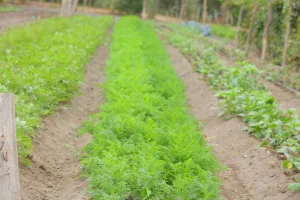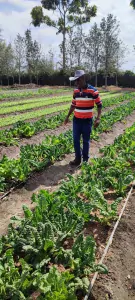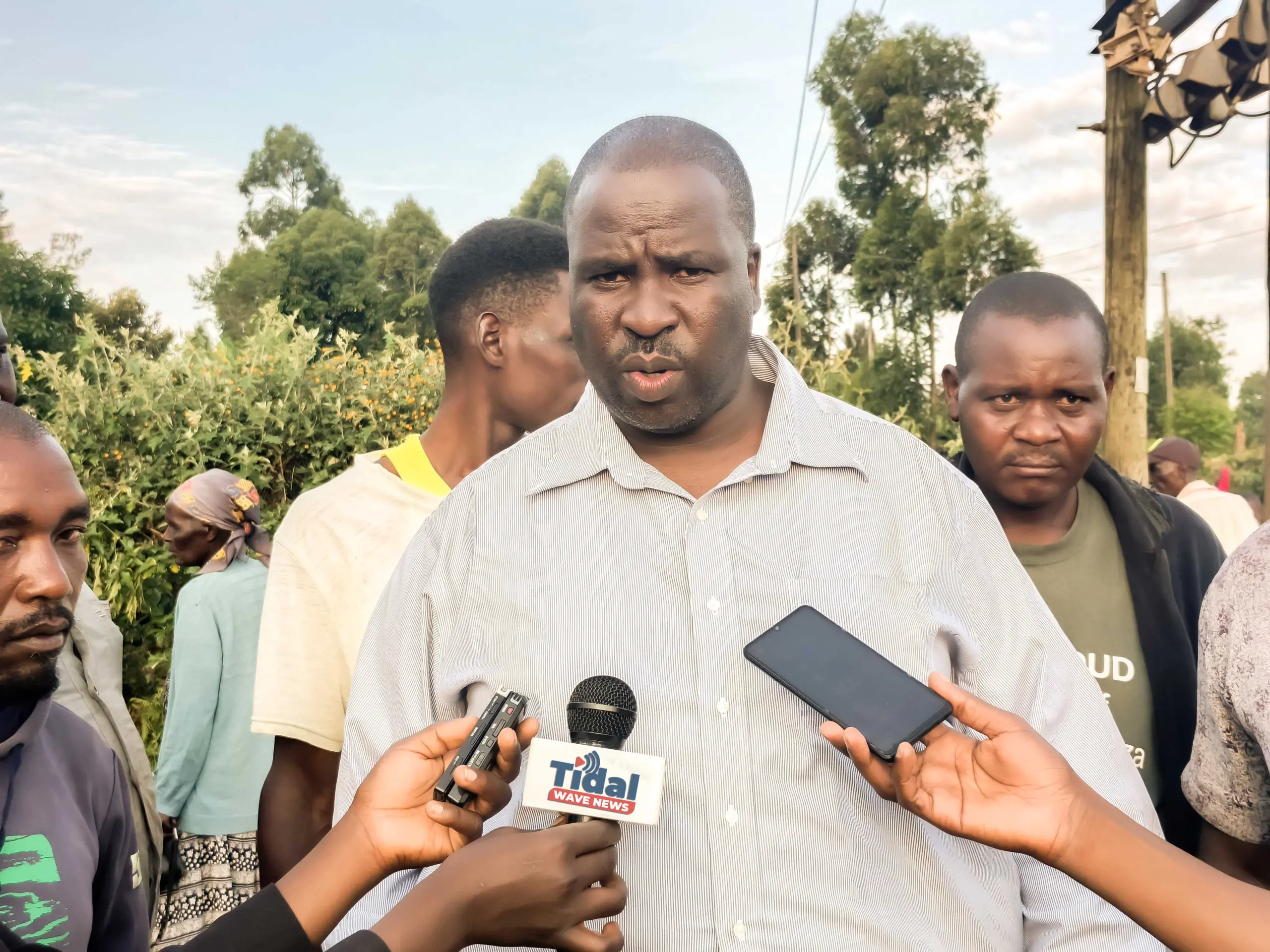
By Arnold Ageta
Unprecedented changes in weather patterns and rising temperatures linked to climate change are wreaking havoc on Kenya’s agricultural sector, jeopardizing food security and livelihoods for millions of farmers across the country.
In recent years, Kenya has experienced erratic rainfall, prolonged droughts, and unexpected, intense downpours, disrupting traditional agricultural practices and pushing farmers to the brink. The effects of climate change are becoming increasingly evident as crop yields dwindle, livestock struggle, and communities face mounting challenges.
Rising temperatures have been particularly detrimental to Kenya’s key crops such as tea and coffee. The iconic tea plantations that have long adorned the picturesque landscapes of the Rift Valley are grappling with reduced yields and quality due to heat stress and altered rainfall patterns. Coffee farmers, once thriving in highland regions, are being forced to shift their cultivation to higher altitudes as warmer temperatures render traditional coffee-growing areas less suitable.
Farmers in Kajiado County are facing changes in the weather because of climate change. To cope with these changes, they are using different ways that they learned from their families and scientists.
In their study, Indigenous knowledge factors influencing farmers’ uptake of climate change adaptation strategies in Kajiado County, Kenya, Stephen Muchaki et al, wanted to know why some farmers use these ways more than others. They found that farmers who know more and have more money tend to use the helpful ways more. On the other hand, older men with larger families and land are less likely to use these ways.
The researchers also discovered that when farmers combine what they already know with what scientists have taught them, it works best to deal with the changing weather. This is important because different places have different types of weather patterns and using both old and new ways can help farmers improve their situation.
According to Daniel Moguche, a permaculturist and environment expert based in Isinya, Kajiado County, rain patterns are no longer predictable.
“For instance, in 2022 we received shallow rains. It rained only five days in March and in December we had 9 days of rain,’’ he laments.
He says people are currently unable to carry out their agricultural activities as before due to prolonged drought in the area.
‘‘Here people rely on animals and last year many farmers lost their animals due to lack or water and grass,’’ he noted.

Rising temperatures are also taking a toll on agricultural productivity. Crops that have thrived in specific regions for generations are now being challenged by heat stress and decreased yields. Maize, a staple crop in Kenya, is particularly vulnerable, with farmers reporting reduced harvests due to the changing climate conditions.
Livestock farming, a vital source of income and nutrition, is also under threat. Heat stress is affecting livestock health and productivity, leading to reduced milk production and weakened animals. Altered disease patterns have exacerbated the situation, causing further strain on already struggling farmers.
He attributes effects of climate change to the heat stress and changing disease patterns that have negatively impacted health and productivity of livestock.
The impoverished farmers who cannot access piped water for irrigation and quenching the thirst of their animals re facing the greatest impact.
‘‘Water is very expensive in this area. A container of 20 litres goes for KES 20 which is not even enough for domestic use,’’ explained Daniel.
The only option to carry out agricultural activities in this area is only through drip irrigation and installation of greenhouses.
Green house installation is equally expensive and only accessible to the rich farmers in the area who are able to install and equip the houses fully for agricultural use.
Nestled in the western highlands, Nyamira County has long been known for its lush, fertile soils and temperate climate.
However, as climate change reshapes weather patterns, even this seemingly idyllic region is grappling with adversity.
Erratic rainfall, a hallmark of shifting climates, has become a formidable adversary to the farmers of Nyamira.
Smallholder farmers, who predominantly rely on rain-fed agriculture, recount the challenges of planting and harvesting in a climate of uncertainty.
With traditional farming calendars upended, crops are suffering from moisture stress, leading to lower yields and financial strain.
The county, known for its tea and banana production, is now witnessing fluctuations in harvests that ripple through local markets and household economies.
In Nyamira’s Township Ward, Sabina Maoga a pumpkin farmer laments of prolonged drought that has affected her negatively.
Her pumpkins produced fewer small sized fruits and others dried attributing this to lack of adequate rainfall.
‘‘As you can see, these are very small pumpkins that survived the prolonged drought. Many plants died dried and it is a big loss for me,’’ he said pointing at the dried pumpkin plants.
Sabina, 60, recalls how it used to rain in the past and how agriculture was profitable for may farmers in Nyamira.
‘‘Nyamira was popularly known for cold weather and long rain seasons. Nowadays it is warmer and reduced rain seasons,’’ he recalls.
She further says: ‘‘We used to grow tomatoes and potatoes in Nyamira county but as effects of climate change hit us, we stopped and we currently buy tomatoes shipped from Laikipia county.’’
Sabina again clarifies that even pyrethrum farming in Nyamira disappeared two decades ago in the advent of effects of climate change in the area.
Milton Ongeri, an agricultural officer with Kilimo Bora Public and Private Partnership Initiative, says rain patterns have changed leaving farmers in confusion.
‘‘Nowadays you cannot predict when the rain season will start. Rain seasons have changed and long rain seasons have disappeared,’’ said Ongeri.
He says: ‘‘Nyamira and Kisii counties used to receive long rain season between March and June but currently, we only receive short rains in March and April.’’
The change of rain patterns has made farmers unable to plan well for their planting seasons because of uncertainty of rain.
According to him, the rise of temperatures has led to the emergency of weeds, pests and diseases that never existed before.
Mr. Ongeri notes that effects of climate change have led to increased pests and diseases, hailstones/hailstorms, drought, floods and high temperatures, low soil fertility due to soil and water erosion.
‘‘These have resulted to reduced crops and livestock production, increased farm operations and expenses and low incomes,’’ said Mr. Ongeri.
‘‘Farmers have witnessed emergence of some crop and animal diseases that never existed. These include fall army worms that were never heard of in Nyamira and Kisii counties, dodder weed which is spreading fast in these counties painting the edges yellow as they feast on the host plants,’’ he laments.
Daniel Moguche advices farmers in dry areas to adopt permaculture principles to make use of organic waste to nourish the soil. Permaculture is a way of designing sustainable systems that mimic nature and prioritize Earth’s well-being and people’s needs.
‘‘Farmers should also have good water management procedures and employ climate smart farming methods like drip irrigation to carry out farming activities in dry areas,’’ he advised.
Farming ways that work well with the climate does not only help farmers harvest more produce but also helps in climate change mitigation.
‘‘Climate smart farming can help farmers mitigate effects of climate change like use of organic fertilizers which are not acidic, use of vertical bags, water harvesting for fishing and double digging,’’ adivised Mr. Ongeri.

People should also embrace sustainable agriculture by planting heat tolerant crops and enhanced agro-forestry where hey can only plant indigenous plants and trees.
‘’We advise farmers grow water friendly trees that do not absorb alt of water form the ground nor interfere with the environment. These trees include markhamia, croton species, Grevillea and fruit trees,’’ said Ongeri.
Mr. Ongeri agrees with Mr. Moguche that they should avoid planting trees like eucalyptus robusta which absorbs a lot of water from the ground and leaves the soil dry.
They both agree that renewable sources of energy should be adopted to avoid the cutting down of trees for firewood and charcoal.
To help farmers adapt to effects of climate change, the government should carry out capacity building for farmers to train them on modern farming methods like climate smart farming.
The government should also put in place policies that conserve the environment ban charcoal burning, logging activities.
Mr. Moguche opposes the recent lift of the logging ban saying it will pull back the achievements that the country had made towards increasing forest cover in the country.
‘‘We need to encourage circular economy where people are trained on recycling especially organic waste to try and restore soil structure to enhance fertility and productivity of the agricultural land,’’ he says.
The government should come into play because they have left farmers empowerment to the NGOs who mostly do not offer everlasting solutions to their problems.
To fill this gap, Kilimo Bora Public and Private Initiative has come to the rescue of farmers in the country. It brings together agricultural stakeholders form both private and public sectors to help farmers in adapting to the effects of climate change.
Sabina Maoga asks the government to focus on climate change mitigation plans to save the country from food insecurity.
‘‘We farmers need government support to practice climate smart agriculture which is sustainable,’’ she concludes.
Local communities and authorities are beginning to recognize the urgent need for adaptation strategies. Some farmers are experimenting with drought-resistant crop varieties and water-saving irrigation techniques.
However, many lack access to resources and information to effectively implement these solutions.
To address these challenges, it’s crucial for Kenya to develop and implement climate-resilient agricultural practices, promote sustainable water management, improve access to weather information and early warning systems, enhance soil conservation efforts, and support farmers in diversifying their livelihoods.
International collaborations and policies focused on mitigating climate change can also play a significant role in minimizing its impacts on agriculture in Kenya.
As Kenya hosts the inaugural Africa Climate Summit this September places the spotlight on the government, urging decisive steps to combat the impacts of climate change in the country and provide vital support to farmers for bolstering food security.
This Summit seeks to tackle the growing vulnerability to climate change and its related costs, on global scale and with specific focus on Africa.
Given the anticipated rise in the frequency and adversity of climate-related crises, swift measures are imperative to address and alleviate these pressing issues.




2 thoughts on “Climate Change’s Wrath on Kenyan Agriculture: Battling Adversity on the Frontlines”